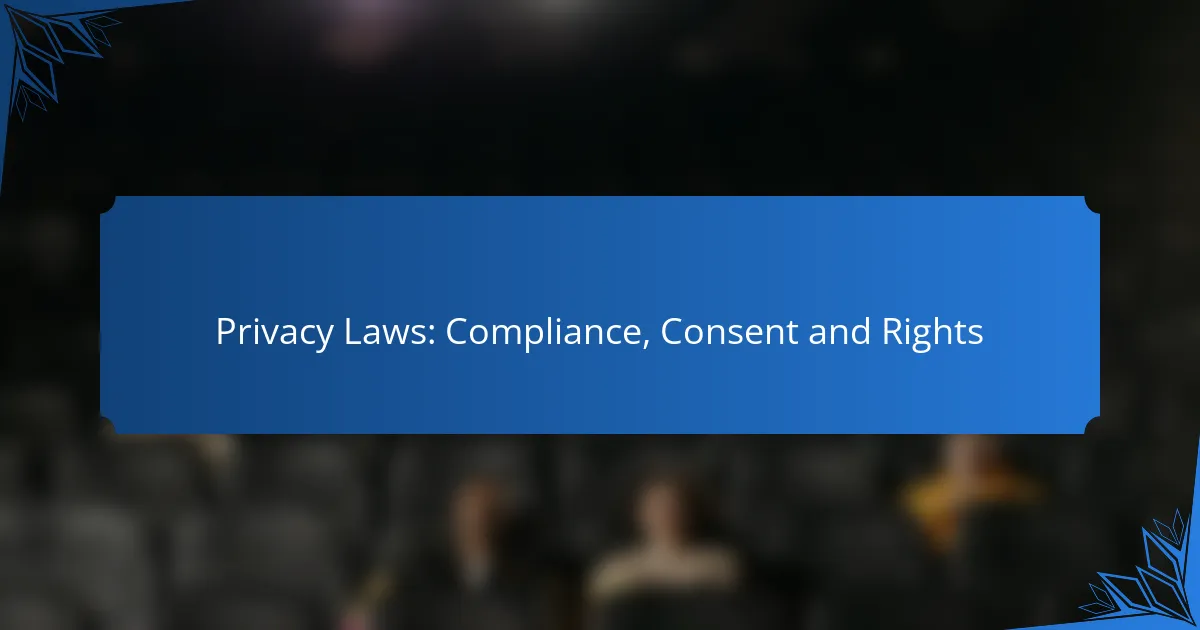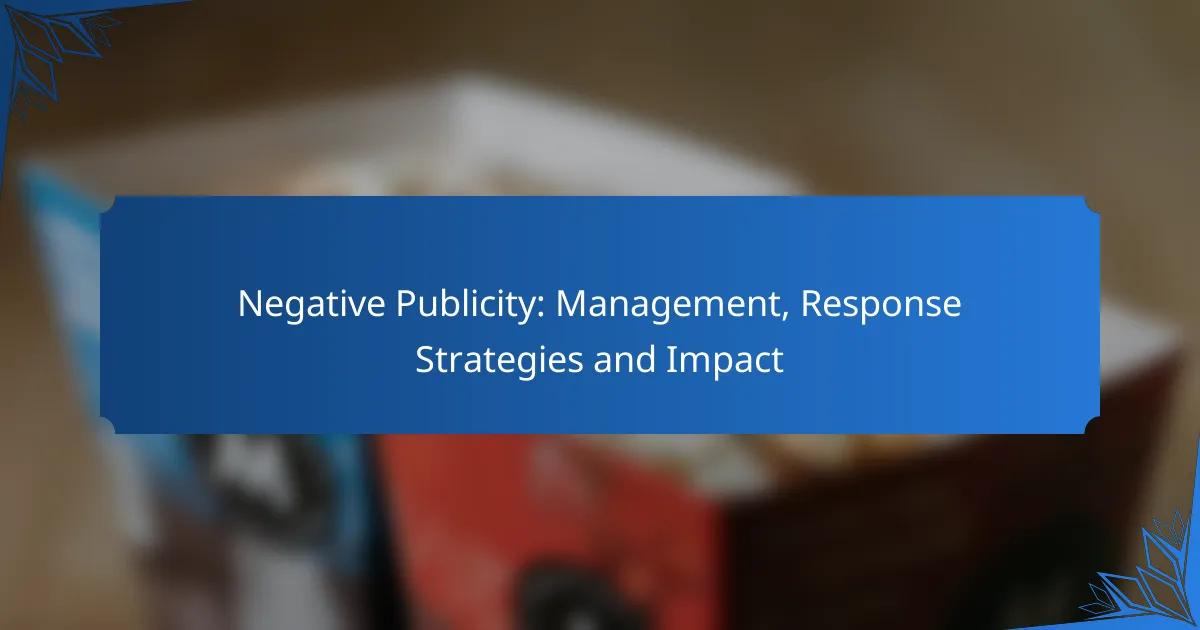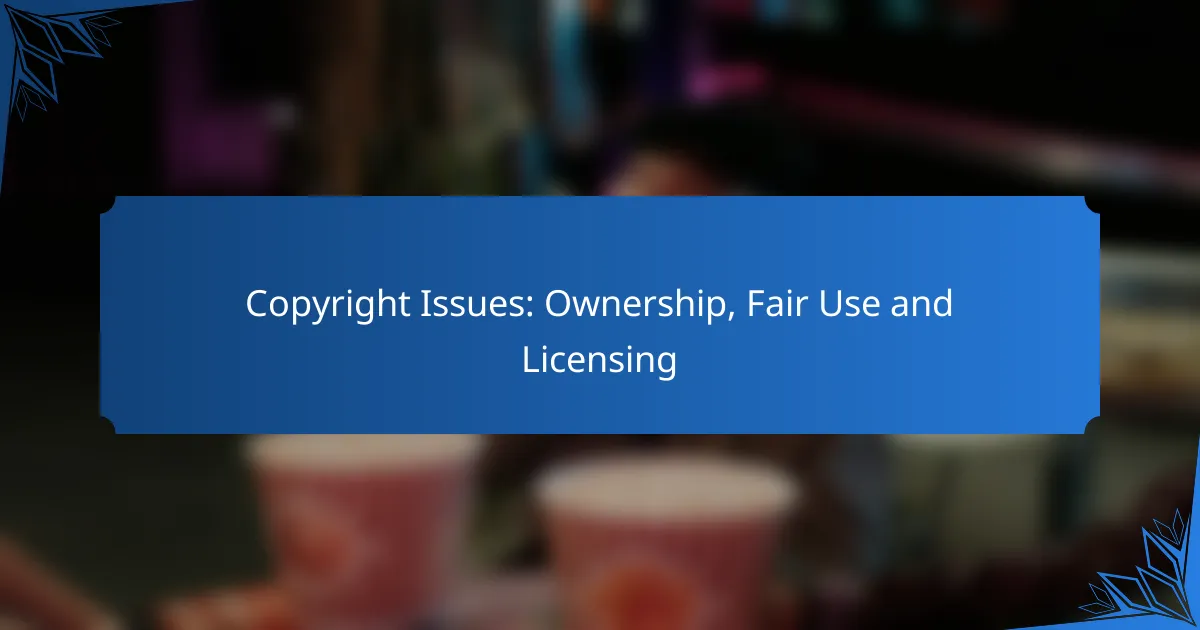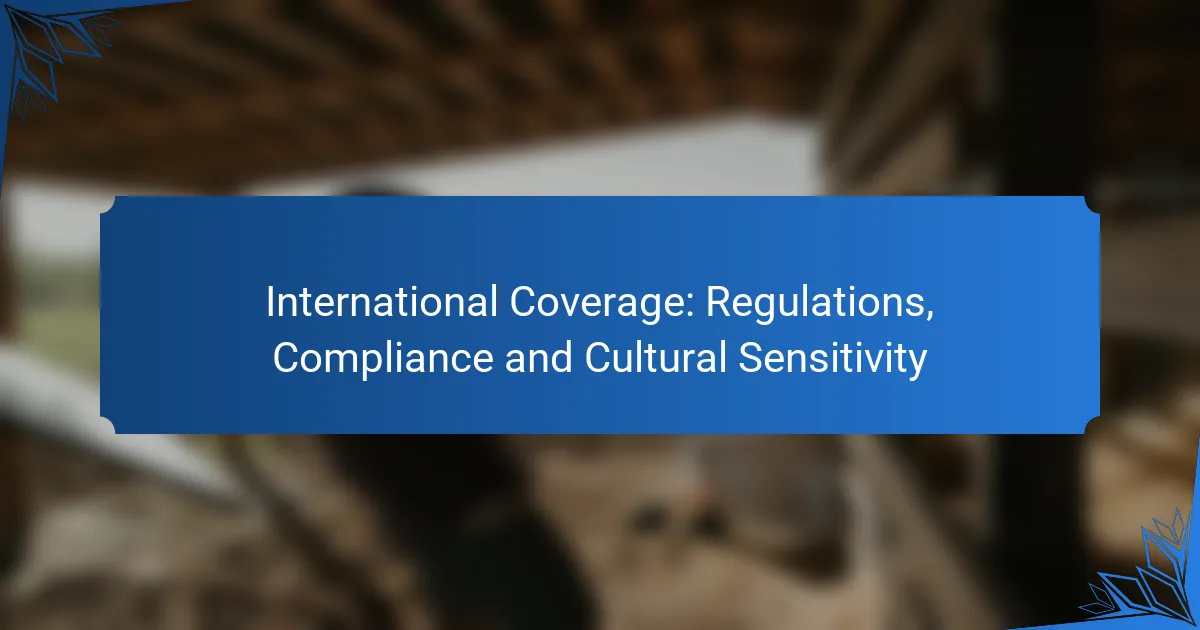Privacy laws in the United States are designed to regulate the collection, use, and protection of personal information, enhancing consumer rights and establishing compliance for businesses. Compliance requires organizations to understand relevant regulations, implement appropriate policies, and maintain transparency with individuals regarding their data practices. Central to these laws is the concept of consent, which empowers individuals to control their personal information and be informed about its usage.
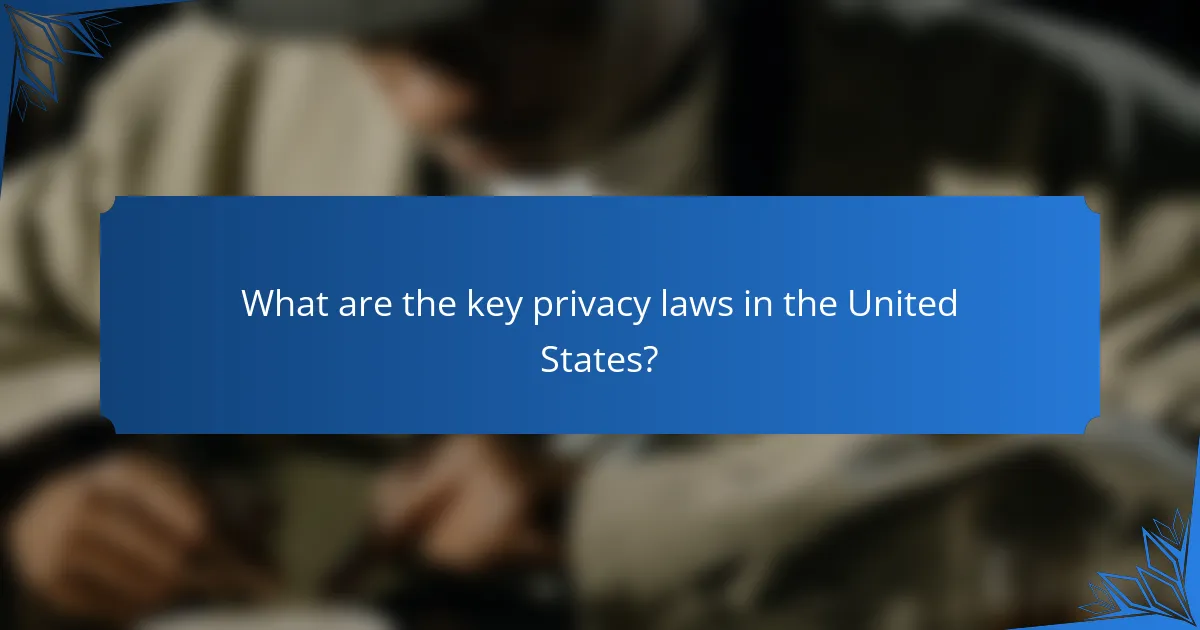
What are the key privacy laws in the United States?
The key privacy laws in the United States include regulations that govern how personal information is collected, used, and protected. These laws aim to enhance consumer rights and establish compliance requirements for businesses handling sensitive data.
California Consumer Privacy Act (CCPA)
The California Consumer Privacy Act (CCPA) is a landmark privacy law that gives California residents rights regarding their personal information. Under the CCPA, consumers can request information about the data collected by businesses, demand deletion of their data, and opt out of the sale of their personal information.
Businesses must comply with CCPA if they meet certain thresholds, such as having annual gross revenues exceeding $25 million or collecting personal information from over 50,000 consumers. Non-compliance can lead to significant fines, making it crucial for businesses to understand their obligations under this law.
Health Insurance Portability and Accountability Act (HIPAA)
The Health Insurance Portability and Accountability Act (HIPAA) establishes national standards for the protection of health information. It applies to healthcare providers, insurers, and their business associates, ensuring that personal health information is kept confidential and secure.
HIPAA requires entities to implement safeguards to protect patient data and grants patients rights to access their health records. Violations can result in hefty fines, so organizations must regularly review their compliance practices and ensure that all staff are trained on privacy policies.
Children’s Online Privacy Protection Act (COPPA)
The Children’s Online Privacy Protection Act (COPPA) is designed to protect the privacy of children under the age of 13 online. It requires websites and online services directed at children to obtain verifiable parental consent before collecting personal information from minors.
Organizations must provide clear privacy policies detailing their data practices and allow parents to review and delete their children’s information. Non-compliance can lead to substantial penalties, emphasizing the importance of adhering to COPPA guidelines for any business targeting young audiences.
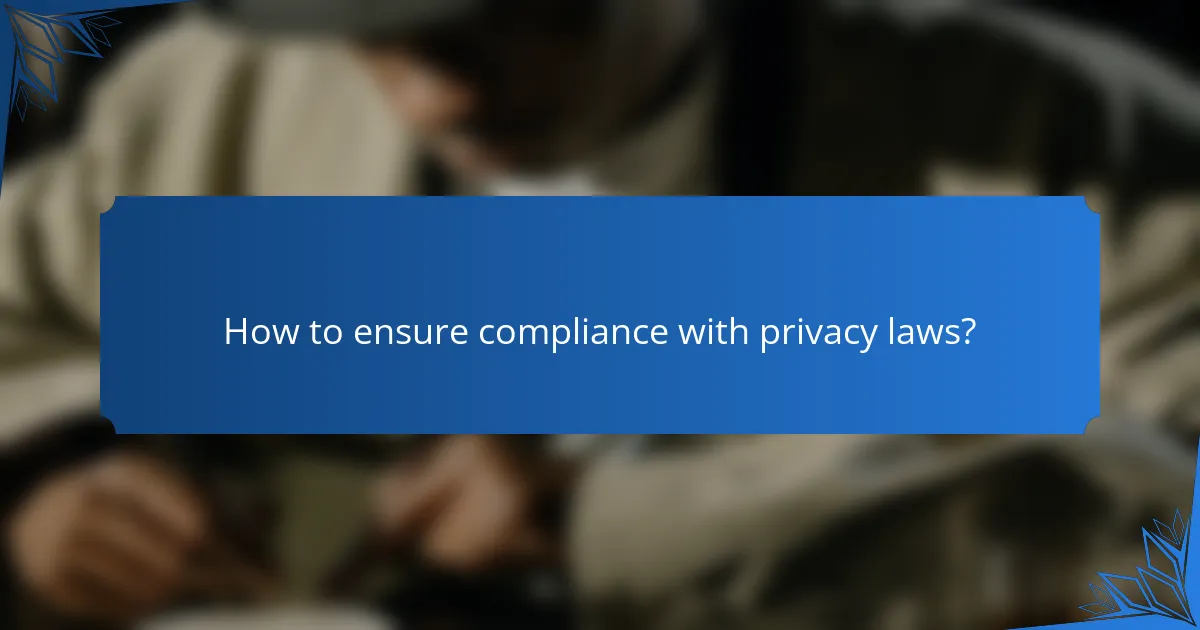
How to ensure compliance with privacy laws?
Ensuring compliance with privacy laws involves understanding applicable regulations, implementing necessary policies, and maintaining transparency with data subjects. Organizations must actively manage data practices to align with legal requirements and protect individual rights.
Conduct regular data audits
Regular data audits are essential for identifying what personal data is collected, how it is used, and where it is stored. These audits should be conducted at least annually and involve reviewing data processing activities against compliance requirements.
During an audit, consider creating a data inventory that lists all data assets, their purposes, and retention periods. This helps in pinpointing areas that may need improvement or adjustment to meet privacy standards.
Implement data protection policies
Establishing clear data protection policies is crucial for guiding employees on how to handle personal data responsibly. These policies should cover data collection, storage, processing, and sharing practices, ensuring they align with privacy laws like GDPR or CCPA.
Regularly update these policies to reflect changes in legislation or organizational practices. Make sure they are easily accessible to all employees and include specific procedures for reporting data breaches or compliance issues.
Provide employee training
Training employees on privacy laws and data protection practices is vital for fostering a culture of compliance. Conduct training sessions at least once a year, focusing on the importance of data privacy and the specific responsibilities of each employee.
Consider using a mix of training methods, such as workshops, online courses, and quizzes, to enhance engagement. Regularly assess employee understanding and adjust training content based on feedback and emerging privacy challenges.
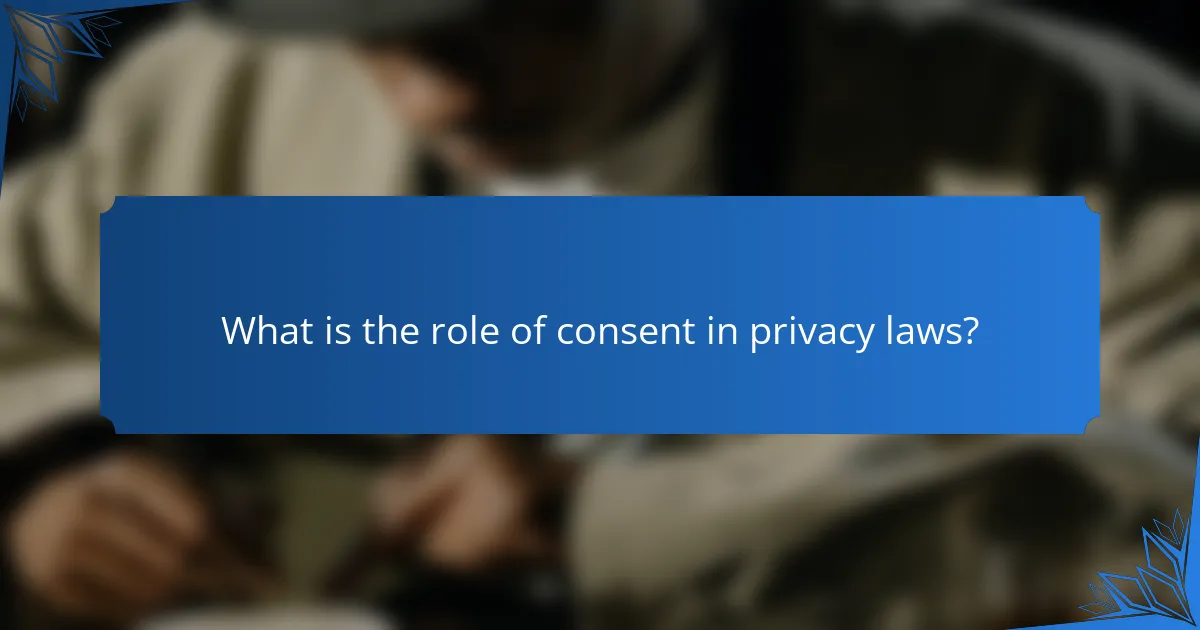
What is the role of consent in privacy laws?
Consent is a fundamental aspect of privacy laws, serving as a legal basis for the collection and processing of personal data. It ensures that individuals have control over their information and are informed about how it will be used.
Explicit consent requirements
Explicit consent requires that individuals provide clear and affirmative agreement before their personal data can be processed. This means that consent must be obtained through a distinct action, such as checking a box or signing a form, rather than implied or assumed.
Many regulations, such as the General Data Protection Regulation (GDPR) in Europe, mandate explicit consent for certain types of data processing, particularly sensitive information like health data. Organizations must ensure that consent is not bundled with other agreements and is easy to withdraw at any time.
Informed consent practices
Informed consent practices involve providing individuals with comprehensive information about how their data will be used, including the purpose of processing, data retention periods, and third-party sharing. This transparency is essential for individuals to make educated decisions regarding their consent.
Organizations should use clear, plain language in their consent forms and avoid legal jargon. It is also beneficial to offer examples of how data will be used, which can help individuals understand the implications of their consent and foster trust.
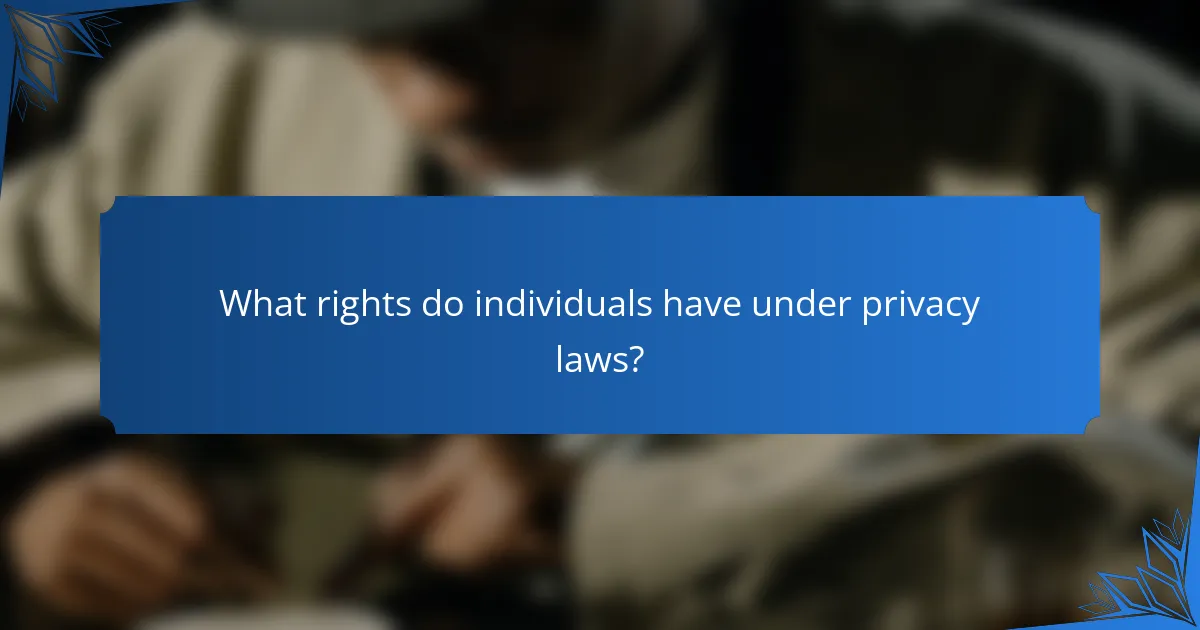
What rights do individuals have under privacy laws?
Individuals have several key rights under privacy laws that empower them to control their personal information. These rights typically include access to their data, the ability to request deletion, and the option to opt-out of data sales.
Right to access personal data
The right to access personal data allows individuals to request and obtain a copy of the information that organizations hold about them. This right is fundamental for transparency and helps individuals understand how their data is being used.
To exercise this right, individuals can submit a formal request to the organization, which is usually required to respond within a specific timeframe, often around 30 days. It’s advisable to specify the types of data being requested to streamline the process.
Right to deletion of data
The right to deletion, often referred to as the “right to be forgotten,” enables individuals to request the removal of their personal data from an organization’s records. This right is particularly relevant when the data is no longer necessary for the purpose for which it was collected.
Individuals should be aware that there may be exceptions to this right, such as when data is needed for legal compliance or legitimate business interests. When making a deletion request, it’s beneficial to clearly state the reasons for the request to enhance the chances of compliance.
Right to opt-out of data sales
The right to opt-out of data sales allows individuals to prevent organizations from selling their personal information to third parties. This right is increasingly important as data monetization practices grow in prevalence.
Individuals can typically exercise this right by submitting an opt-out request through a designated process, often found on the organization’s website. It’s crucial to check whether the organization has a clear policy regarding data sales and the steps needed to opt-out effectively.
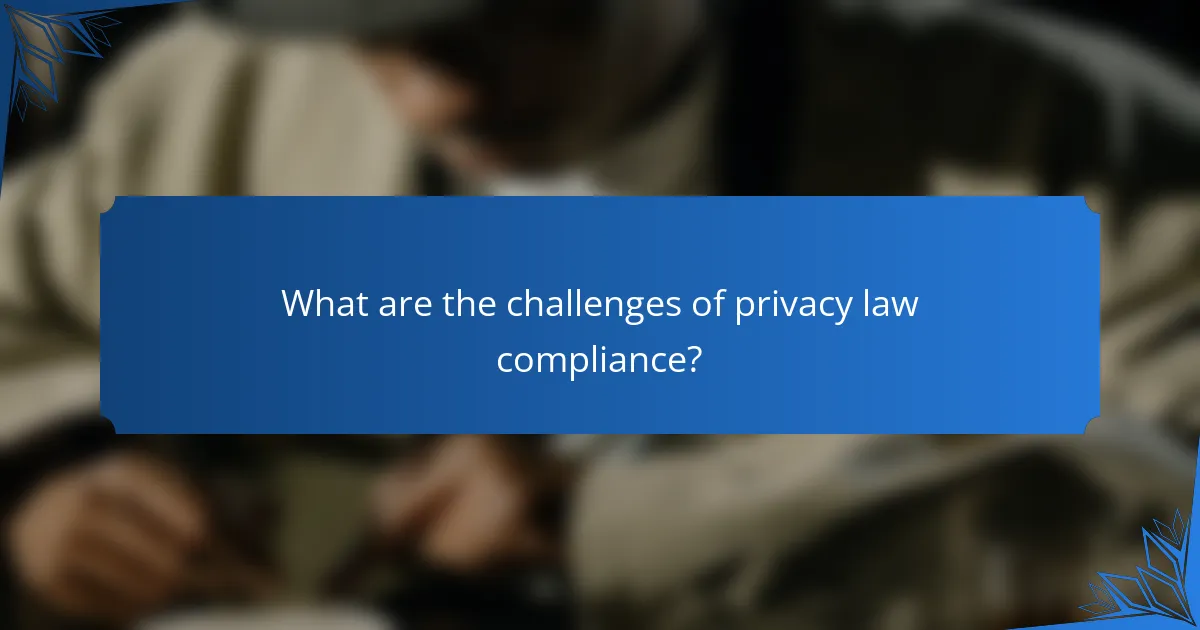
What are the challenges of privacy law compliance?
Privacy law compliance presents significant challenges due to the evolving nature of regulations and the complexities involved in meeting them. Organizations must navigate various legal frameworks while ensuring they respect user consent and uphold individual rights.
Complexity of regulations
The landscape of privacy regulations is intricate, with laws varying widely across jurisdictions. For instance, the General Data Protection Regulation (GDPR) in Europe imposes strict requirements on data handling, while the California Consumer Privacy Act (CCPA) introduces different obligations in the United States. Organizations must stay informed about these regulations to avoid hefty fines.
Moreover, the interplay between local, national, and international laws adds layers of complexity. Companies operating in multiple regions must develop compliance strategies that account for these differences, which can be resource-intensive and time-consuming.
Resource allocation for compliance
Effective compliance with privacy laws requires significant investment in resources, including personnel, technology, and training. Organizations need to allocate budgets for legal counsel, compliance officers, and data protection technologies to ensure adherence to regulations. This can strain smaller businesses that may lack the necessary financial and human resources.
Additionally, ongoing training for employees is crucial to maintain compliance. Regular workshops and updates on privacy laws can help mitigate risks associated with data breaches and non-compliance. Companies should consider establishing a dedicated compliance team to oversee these efforts and ensure that all staff members understand their responsibilities regarding data privacy.
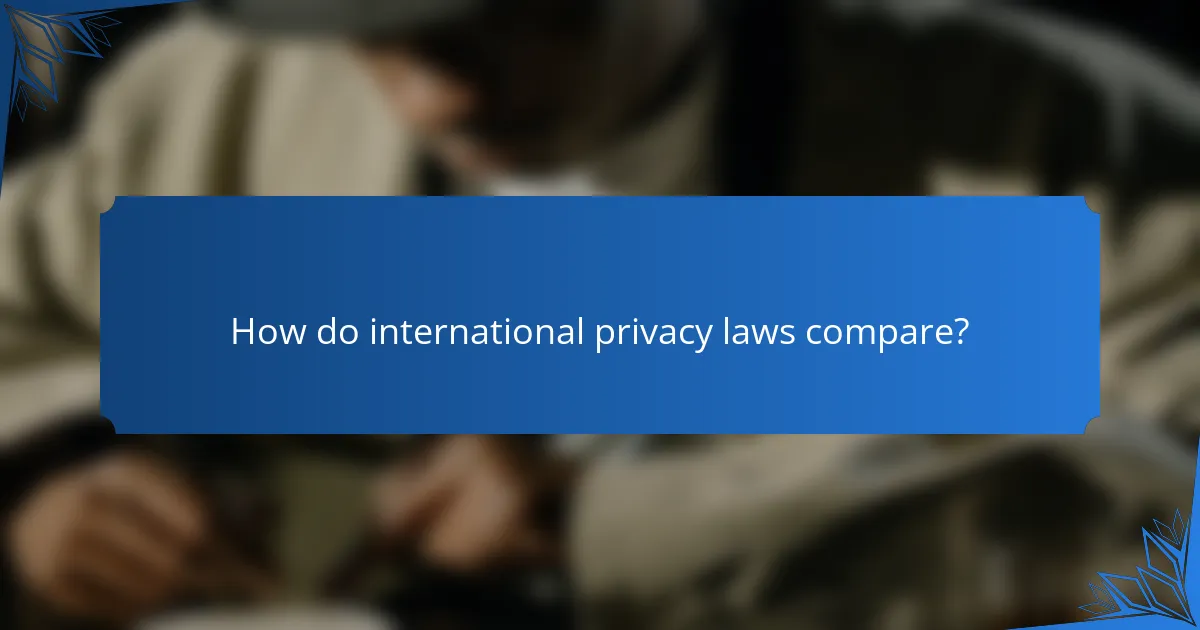
How do international privacy laws compare?
International privacy laws vary significantly in their scope, requirements, and enforcement mechanisms. Key regulations like the GDPR in Europe, CCPA in California, and PIPEDA in Canada each have unique features that organizations must navigate to ensure compliance.
General Data Protection Regulation (GDPR)
The GDPR is a comprehensive privacy law in the European Union that sets strict guidelines for data collection and processing. It emphasizes user consent, requiring organizations to obtain clear and affirmative consent before handling personal data.
Under the GDPR, individuals have rights such as access to their data, the right to rectify inaccuracies, and the right to erasure. Non-compliance can lead to hefty fines, often reaching up to 4% of annual global turnover or €20 million, whichever is higher.
California Consumer Privacy Act (CCPA)
The CCPA grants California residents specific rights regarding their personal information, including the right to know what data is collected and the right to opt-out of its sale. Unlike the GDPR, the CCPA does not require explicit consent for data collection but mandates transparency and user control.
Businesses must provide clear notices about data practices and allow consumers to request deletion of their information. Penalties for non-compliance can range from $2,500 to $7,500 per violation, emphasizing the importance of adherence.
Personal Information Protection and Electronic Documents Act (PIPEDA)
PIPEDA is Canada’s federal privacy law that governs how private sector organizations collect, use, and disclose personal information. It requires organizations to obtain consent for data collection and to inform individuals about the purpose of data usage.
Individuals have the right to access their personal information held by organizations and request corrections. Organizations that fail to comply with PIPEDA may face investigations and potential fines, making compliance essential for Canadian businesses.
